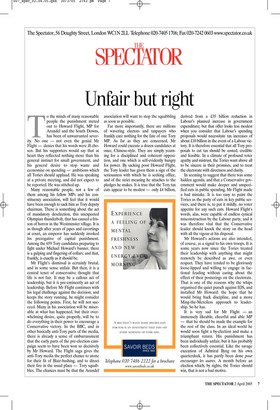Unfair but right
Tothe minds of many reasonable people the punishment meted out to Howard Flight, MP for Arundel and the South Downs, has been of unwarranted severity. No one — not even the genial Mr Flight — denies that his words were ill chosen. But his supporters would say that at heart they reflected nothing more than his general instinct for small government, and his general desire to stop waste and economise on spending — ambitions which all Tories should applaud. He was speaking at a private meeting, and did not expect to be reported. He was stitched up.
Many reasonable people, not a few of them among his fellow MPs and his constituency association, will feel that it would have been enough to sack him as Tory deputy chairman. There is something about the act of mandatory deselection, this unexpected Olympian thunderbolt, that has caused a frisson of horror in the Westminster village. It is as though after years of japes and cavortings at court, an emperor has suddenly invoked his prerogative of capital punishment. Among the 659 Tory candidates preparing to fight under Michael Howard’s banner, there is a gulping and fingering of collars; and that, frankly, is exactly as it should be.
Mr Flight’s dismissal is certainly brutal, and in some sense unfair. But then, it is a central tenet of conservative thought that life is not fair. It may be a callous act of leadership, but it is pre-eminently an act of leadership. Before Mr Flight continues with his legal challenge against the decision, and keeps the story running, he might consider the following points. First, he will not succeed. Many in his association will be miserable at what has happened, but their overwhelming desire, quite properly, will be to do everything in their power to encourage a Conservative victory. In the BBC, and in other basically anti-Tory parts of the media, there is already a sense of embarrassment that the early parts of the pre-election campaign seem to have been won so decisively by Mr Howard. The Flight saga gives the anti-Tory media the perfect chance to atone for their fit of Blair-bashing, and to direct their fire in the usual place — Tory squabbles. The chances must be that the Arundel association will want to stop the squabbling as soon as possible.
Far more importantly, there are millions of wavering electors and taxpayers who frankly care nothing for the fate of one Tory MP. As far as they are concerned, Mr Howard could execute a dozen candidates at once, Chinese-style. They are simply yearning for a disciplined and coherent opposition, and one which is self-evidently hungry for power. By sacking poor Howard Flight, the Tory leader has given them a sign of the seriousness with which he is seeking office, and of the strict meaning he attaches to the pledges he makes. It is true that the Tory tax cuts appear to be modest — only £4 billion, derived from a £35 billion reduction in Labour’s planned increase in government expenditure; but that offer looks less modest when you consider that Labour’s spending proposals would necessitate tax increases of about £10 billion in the event of a Labour victory. It is therefore essential that all Tory proposals to cut tax should be costed, credible and feasible. In a climate of profound voter apathy and mistrust, the Tories want above all to be sincere in their promises, and to treat the electorate with directness and clarity.
In seeming to suggest that there was some hidden agenda, and that a Conservative government would make deeper and unspecified cuts in public spending, Mr Flight made a bad mistake. It is too easy to paint the Tories as the party of cuts in key public services, and there is, to put it mildly, no voter appetite for any such cuts. Howard Flight’s words, alas, were capable of endless cynical misconstruction by the Labour party, and it was therefore vital that the Conservative leader should knock the story on the head with all the vigour at his disposal.
Mr Howard’s actions are also intended, of course, as a signal to his own troops. It is some years now since the Tories treated their leadership with anything that might remotely be described as awe, or even respect. They have tended to be gloriously loose-lipped and willing to engage in factional feuding without caring about the effect of their posturings on the electorate. That is one of the reasons why the whips organised the quiet putsch against IDS, and installed Mr Howard: the hope that he would bring back discipline, and a more Ming-the-Merciless approach to leadership. So he has.
It is very sad for Mr Flight — an immensely likeable, cheerful and able MP — that he should be made the example for the rest of the class. In an ideal world he would soon fight a by-election and make a triumphant return. His punishment has been individually unfair, but it has probably been collectively essential. Like the savage execution of Admiral Byng on his own quarterdeck, it has partly been done pour encourager les autres. A month before an election which, by rights, the Tories should win, that is not a bad motive.





























































 Previous page
Previous page